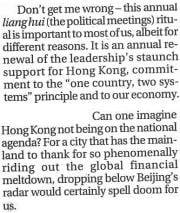 Bloomberg report that the GDP of Shanghai has overtaken that of the Big Lychee for the first time “in at least three decades.” What they mean is that they can’t find any pre-1980 data for the mainland metropolis. The last time it surpassed the then-British colony was probably back in the 1930s, when Shanghai had the factories, department stores, night life, film studios and money, and Hong Kong was a sleepy trading backwater.
Bloomberg report that the GDP of Shanghai has overtaken that of the Big Lychee for the first time “in at least three decades.” What they mean is that they can’t find any pre-1980 data for the mainland metropolis. The last time it surpassed the then-British colony was probably back in the 1930s, when Shanghai had the factories, department stores, night life, film studios and money, and Hong Kong was a sleepy trading backwater.
As Bloomberg point out, mainland GDP figures are still not especially reliable; local government officials have an interest in exaggerating results and exceeding targets – though some, notably in the south, are rumoured to under-report in order to pay less tax to the centre.
The Shanghai of this story, however accurate, comprises the city with the ugly skyscrapers we all know and love, plus a large rural hinterland. It adds up to 2,500 square miles in size, versus the Big Lychee’s humble 425, and its population is 19 million to Hong Kong’s 7 million. So people there are still significantly less productive, creating barely a third the amount of wealth per person than Hongkongers. It was only two years ago that Shanghai proudly announced to the world that its farmers’ annual disposable income had exceeded the grand sum of US$1,400.
The ‘Shanghai faction’ who graduated from running the municipality to the nation in the 1990s under Jiang Zemin lavished their favourite city with resources. This led to heavy subsidies for foreign investment, generous land and other aid for favoured local companies and a more state-planned economy than in many other parts of China. As a result, it is less accomplished than it likes to think in comparison with other regions, with low levels of rural entrepreneurship, self-employment and patent applications, and low average size of private-sector companies.
But it works hard on its image. During a visit in the mid-90s, I saw a checklist of grand vanity projects, described as ‘pearls’ if I remember rightly. They included the grotesque TV tower, which had just opened (you had to wade through mud to get to it), the impressive museum with galleries named for Hong Kong tycoons, and the yet-to-be-built opera house. Some schemes, like many of the skyscrapers and the maglev train from the new airport to a suburb, were plain tacky. Like Singapore, Shanghai seems to believe its own PR.
(Beijing’s decision a year ago that Shanghai will be the PRC’s official, number-one, oh-so-important international financial and (for some reason) shipping hub by 2020 looks like a pat on the head for Jiang’s old clique in retreat. One particularly desperate policy would be to subsidize private equity managers’ salaries if they set up shop in Pudong – why didn’t Lee Kwan Yew think of it first?)
The Shanghai-will-take-over-from-Hong Kong idea took off after the Big Lychee’s handover to China in 1997. So traumatic was Hong Kong’s shock after the city’s bubble burst – five years’ deflation interspersed with suicides and SARS – that some impressionable local folk saw it as a deliberate policy of Beijing’s. Jiang Zemin, the theory went, had ordered chief executive Tung Chee-hwa to wreck Hong Kong in order to create the space for their Yangtze Delta homeland to rise in its place. (Maybe a few even pondered Shanghai’s fate after the communists took power in 1949 and downgraded its economic role to cleanse it of capitalist, foreign decadence.)
If there was a plot to undermine the Big Lychee it was opportunistic and aimed at local morale and self-confidence. Official reassurances that Shanghai was a partner and not a rival and talk of the need for integration grew more insistent, as if to sow the seeds of doubt – especially combined with Shanghai’s leering hubris as it became the world’s top container port and won silly prizes like the Expo. Then came the Great 2006 Marginalization Scare kicked off by chief secretary Rafael Hui and picked up with glee by pro-Beijing ranters eager to frighten disloyal fellow Hongkongers into toeing the line.  Horseshit about how grateful pitiful Hong Kong should be for the mainland’s supposedly generous support is now swallowed without question (as yesterday by the South China Morning Post’s Alice Wu, on the right).
Horseshit about how grateful pitiful Hong Kong should be for the mainland’s supposedly generous support is now swallowed without question (as yesterday by the South China Morning Post’s Alice Wu, on the right).
The Big Lychee’s leaders remain patriotically silent about Shanghai’s numerous shortcomings and inadequacies as even a junior international financial hub. Even when reminding the world that Hong Kong has no capital controls, an independent judiciary and a free press, they will never add “unlike Shanghai, which has corruption, protectionism, covered-up scandals, IP rip-offs, investor rip-offs, not to mention thugs that smash up migrant labourers’ kids’ schools, hospitals that dump the poor in the street to die and a government obsessed with the banning of pajamas in public.”
One last thing: when did anyone last see a Hong Kong hooker in Shanghai?


“One last thing: when did anyone last see a Hong Kong hooker in Shanghai?”
I dunno…when was the last time Donald Tsang was up there?
The problem is not Shanghai “supposed” surpassing of Hong Kong. The real problem is incompetent leadership. First with Tung, now with Tsang, Hong Kong severly lacks political leaders of vision and ability that can drive Hong Kong forward. This is partly due to the colonial era when the British did’nt encourage locals to any leadership position until just prior to the handover. More importantly, it’s down to the hamstrung political system which caters to the interest of tycoons instead of the citizen.
Another thing is the consistent failure of the SAR gov to sell and market Hong Kong’s unique strengths. More and more we are seen as merely just another Chinese city. Our independent legal system, fluency in English and general international experience is ignored time and again. This is something Shanghai knows how to do. Shanghai knows how to sell itself. How long will it take for the Hong Kong gov to wake up and be more aggressive? Is it because it is politically incorrect for HK to speak up? Is’nt it tell for the SAR gov to act in the interest and benefit of Hong Kong for a change?
I like the fact that there is no ‘leadership’ in HK. I, for one, do not need any ‘leader’ in my life. I can lead my own life, thank you.
When Coppletwaithe, or whatever his blessed name was, established “laissez faire” way back when, it was good. If only we can keep it that way (so let’s dump MPF, for starters).
It’s Cowperthwaite.
And we don’t need anybody, least of all from the blasted HK government, to “sell and market HK’s unique strengths”.
It would be best if these meddling buffoons would simply shut up and leave us alone.
“This is partly due to the colonial era when the British did’nt encourage locals to any leadership position until just prior to the handover. ”
Oh yeah, that must be it. Blame the colonialists for making Hong Kong the sycophantic, “exists-solely-to-make-money-for- property developers” , “we-want-to -be-only -another (but inferior)-city-of-China” it is today.
The BRITISH set all that in motion! Nothing to do with the thrusting, forward-thinking, modern and hard-working current administration at all.
No wonder HK is going down the drain, with you bunch of pathetic idiots. You morons actually think there is real lassie-faire in Hong Kong? Hello? The government controls the land here. The tycoons earns their billions from it. So there is no hope in Hong Kong after all.
Oh wait, do I detect nostalgia for the colonial days when you gweilos were the master? Sorry to break it to you, but those days are over. You can all move back to UK if you like, I’m sure everything is nice and swell there.
That of course dosen’t excuse the incompetence we see in the SAR gov. HK has to be it’s own master. We need our own voice and not be a mere puppet of UK, and now Beijing.
Chanboy: If you feel that it is common in Hong Kong with ‘fluency in English and general international experience’ you better take another look around. I’m an exchange student in Hong Kong from Sweden and have spent only 7 months here but this is not the case generally. Neither professionally, at the barber’s or in the academic world.
Sadly, the most fluent English I have encountered in Hong Kong is from the maids and prostitutes originating from Indonesia and Philippines.